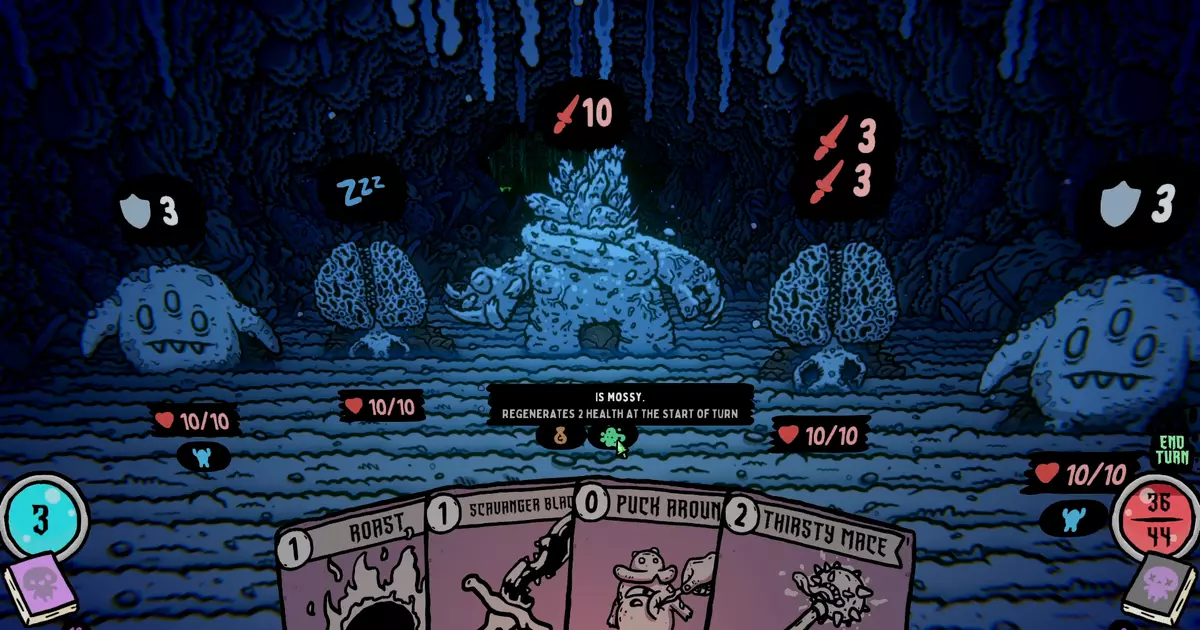In the realm of indie gaming, few titles manage to capture the imagination like the oddly named *Shroom And Gloom*. The name alone conjures an atmosphere tinged with the whimsical yet dark. Imagine a digital world where mushrooms reign, not just as a food source or a mere background element of nature, but as a centerpiece in a conflict that is both bizarre and eerily captivating. At first glance, the game invites exploration through its moody visuals and rich potential for narrative, yet it simultaneously raises eyebrows with its unconventional mechanics that push the boundaries of typical gaming experiences.
The protagonist finds themselves navigating a grotesque underbelly of fungal life, a subaqueous connection to the caverns of their subconscious perhaps. The game’s design is reminiscent of a twisted fairy tale—a world where mushrooms have personalities and lives, reminiscent of the lowly creatures often overlooked in real-world foraging. Unlike traditional role-playing games which often romanticize nature, *Shroom And Gloom* presents a chilling tableau where every spore and cap embodies existential dread. Indeed, one cannot help but ponder the grim prospects faced by these fungi, especially with a rampaging human character wielding butcher knives and fireballs, symbolizing humanity’s chaotic interface with nature.
As players delve deeper, they must engage in a novel form of combat that could be best described as frantic absurdity. The gameplay mechanics introduce an unusual card battle system that challenges expectations. Players are thrust into chaotic skirmishes that require not only strategic thinking, but a morbid sense of humor. The absence of conventional healing options forces players to resort to drastic measures, where survival is achieved through the consumption of their conquered foes. With every mushroom felled, there’s an unsettling decision to make, highlighting the game’s core decision-making dilemma—when does sustenance become sacrilege?
Adding layers to this hysteric mix is the “mood” system, a feature which encourages players to reflect their emotional state into the gameplay. The incorporation of “repressed rage” and “impatience” as direct influences on the game mechanics is not just innovative—it’s a commentary on mental health amidst adversity. Each choice becomes a tactical maneuver in both gameplay and introspection, as players can derive buffs from their own emotional unraveling, creating an introspective experience rarely seen in video games. The notion that a player can achieve victory by becoming their own worst enemy opens doors to profound self-reflection, albeit through an intrinsically chaotic façade.
Exploration in *Shroom And Gloom* does not merely serve the function of world-building; it intertwines with narrative progression, facilitating an emotionally charged journey through its hazardous terrains. Players encounter various fungi adversaries, each with distinct characteristics, painting a picture of a rich ecosystem at odds with a malevolent, mad human. The visuals, a chaotic blend of 2D and 3D elements, evoke a visceral response, making one feel as though they are traversing the bowels of an organism, riddled with remnants of a previous life, perhaps a reflection of humanity’s consumption of the natural world.
This grim aesthetic is complemented by the developers’ ambition to craft a game world brimming with unique enemies and dense pathways to explore. Developers Team Lazerbeam, alongside their partners Free Lives, provide glimpses of future visions for this game. Their aspiration hints at an expansive universe waiting to be unraveled, yet they maintain transparency about the prototype’s rough edges—a reminder that the creative process is often fraught with challenges.
*Shroom And Gloom* serves as a bizarre yet thought-provoking journey through a world that blends humor with horror, inviting players to confront themes of consumption, moral ambiguity, and the unsettling relationship humanity holds with nature. As players wreak havoc on these diligent fungi while grappling with their own chaotic moods, the experience resonates as something deeper than mere entertainment. It becomes a reflection of our own lives—the absurdity of existence laced intricately within a strange and enchanting universe of mushrooms. There’s little doubt; expanding upon this game may lead to moments of introspection that can be eerily entertaining and profoundly insightful, beckoning players to consider the ramifications of their actions in both gaming and life.

